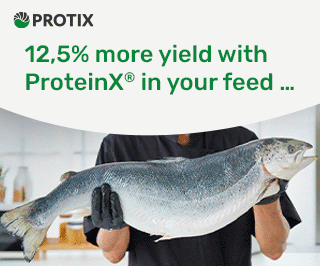The Australian government’s attempts to straddle the fence between supporting the lucrative salmon industry and addressing environmental concerns aren’t working.
Last week, a press conference led by Australian Prime Minister Anthony Albanese outside a Tassal processing plant in Tasmania was disrupted by the shouts of environmental activists calling for the shut down of the state’s salmon industry.
“As you can hear from the chanting, there is a fair bit of a battle on between the salmon industry and the environmentalists … is today showing you have already picked a side?” a reporter asked the Australian PM, who has earlier toured the facility wearing a Tassal branded trucker’s cap.
“We stand on the side of jobs, but we also stand on the side of sustainability,” Mr Albanese responded. The response epitomises a leadership style that seeks to please everyone but risks satisfying no one.
Could Australia follow Canada in shutting down salmon farming to protect wild fish?
Cakeism
The Prime Minister’s attempt to straddle the fence between supporting the lucrative salmon industry and addressing environmental concerns is indicative of a broader issue: a lack of decisive leadership. This ‘have your cake and eat it’ approach, while politically convenient, does little to address the fundamental tensions between economic development and environmental stewardship.
This weakness is highlighted by the mixed messages coming from within his own cabinet. Before Christmas, Environment Minister Tanya Plibersek threw fuel on the fire by warning that the salmon industry could face shutdown if significant issues were found, a move that appeased environmental lobbyists but sent shockwaves through the industry.
Of course, the mixed messaging may reflect internal tensions within the country’s Labour Party, with Pilbersek often seen as a rival of Albanese or even a potential replacement, but that underlines just how important it is that Albanese retain a tight grip on messaging.

Cornerstone industry
The salmon industry is a cornerstone of Tasmania’s economy, contributing significantly to employment and regional prosperity, directly employing approximately 2,000 staff and supporting more than 3,000 related jobs, as well as supplying more than 90% of Australian Atlantic salmon production, at a value of more than $1 billion.
Read more: More than 65% support salmon farming in Tasmania finds survey
It’s an industry that deserves the full backing of the government, especially given its potential for further growth and investment. Yet, the Albanese administration’s wavering stance sends mixed signals, creating an environment of uncertainty and doubt. Businesses thrive on predictability and clear policy directions, neither of which are currently being offered.
Leadership needed
Environmental concerns, including the preservation of endangered species such as the Maugean Skate, are undoubtedly important. However, the solution isn’t to pit environmentalism against economic progress.
What’s needed from the Albanese administration is not a balancing act but a clear, assertive stance that supports the salmon industry’s growth within a framework of environmental sustainability. This requires leadership that is willing to make tough decisions, articulate a clear vision, and provide the certainty needed for both the industry and environmental stakeholders.
In its current form, the government’s approach is not just a missed opportunity; it’s a recipe for continued conflict and stagnation. It’s time for the Australian government to offer more than platitudes and take a definitive stand in support of one of its most valuable industries.



